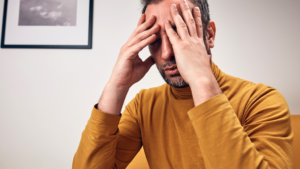Finding Calm Within the Storm: 12 Tips for Coping with Anxiety and Stress
Finding Calm Within the Storm: Tips for Coping with Anxiety and Stress

In today’s fast-paced and demanding world, it’s not uncommon to experience feelings of anxiety and overwhelming stress. The good news is that there are effective strategies and techniques to help you find calm amidst the storm. In this blog post, we’ll explore empathy-driven tips and practices that can assist you in coping with anxiety, managing stress, and navigating through overwhelming emotions. Remember, you’re not alone on this journey, and by implementing these strategies with kindness towards yourself, can regain control over your mental well-being.
1. Understanding Anxiety and Stress:
Begin by developing an understanding of anxiety and stress. Recognize that these emotions are normal responses to life’s challenges, and you are not alone in experiencing them. Educate yourself about the physiological and psychological aspects of anxiety and stress, as knowing what is happening in your body and mind can help you better manage these emotions.
2. Cultivate Self-Compassion:
Practice self-compassion by offering yourself kindness, understanding, and support. Be gentle with yourself when facing anxious thoughts or stressful situations. Remember that everyone experiences difficulties, and treating yourself with compassion is a vital step towards managing anxiety and stress.
3. Relaxation Techniques:
Discover relaxation techniques that work best for you. Deep breathing exercises, progressive muscle relaxation, or guided imagery can help activate your body’s relaxation response, reducing anxiety and promoting a sense of calm. Experiment with different techniques and incorporate them into your daily routine.
4. Mindfulness and Meditation:
Embrace mindfulness and meditation practices to anchor yourself in the present moment. These practices can be powerful tools for managing anxiety and stress. Engage in mindful breathing exercises, body scans, or guided meditations to cultivate awareness and create space between yourself and anxious thoughts or stressful situations.
5. Emotional Regulation:
Learn how to manage overwhelming emotions by developing emotional regulation skills. Practice identifying and acknowledging your emotions without judgment. Find healthy outlets to express and process your feelings, such as journaling, talking to a trusted friend or therapist, or engaging in creative activities like art or music.
6. Healthy Lifestyle Habits:
Maintain a balanced and healthy lifestyle to support your mental well-being. Prioritize regular exercise, adequate sleep, and a nutritious diet. Engaging in physical activity releases endorphins, which can improve your mood and reduce anxiety. Additionally, nurturing your body with healthy foods and quality sleep contributes to overall emotional resilience.
7. Seek Support:
Know that seeking support is a sign of strength, not weakness. Reach out to trusted friends, family members, or mental health professionals when needed. Sharing your thoughts and feelings with others who understand and empathize can provide valuable support and perspective.
8. Establish Boundaries:
Set healthy boundaries in your personal and professional life. Learn to say “no” to activities or commitments that will overwhelm you. Understand that it’s okay to prioritize your well-being and take time for self-care.
9. Engage in Self-Care Activities:
Make self-care a priority by engaging in activities that bring you joy and relaxation. Whether it’s taking a bubble bath, going for a walk in nature, practicing yoga, or indulging in a hobby, make sure to allocate time for activities that replenish your energy and promote a sense of calm.
10. Challenge Negative Thoughts:
Often, anxiety and stress are fueled by negative thoughts and assumptions. Challenge these thoughts by asking yourself if they are rational and based on evidence. Replace negative thoughts with positive affirmations and realistic perspectives to counteract anxious thinking patterns.
11. Practice Gratitude:
Cultivate an attitude of gratitude by focusing on the positive aspects of your life. Take a few moments each day to reflect on what you’re grateful for, whether it’s your health, relationships, or simple moments of joy. Practicing gratitude can shift your mindset and help reduce anxiety and stress.
12. Engage in Physical Activity:
Regular exercise is a powerful tool for managing anxiety and stress. Engaging in physical activity releases endorphins, which are natural mood boosters. Find an activity that you enjoy, whether it’s jogging, dancing, practicing yoga, or playing a sport, and incorporate it into your routine.
Conclusion:
Remember, coping with anxiety and stress is a journey, and it’s essential to approach yourself with empathy and patience along the way. By integrating these tips and strategies into your daily life, you can regain a sense of calm and control over your mental well-being. Embrace self-compassion, practice relaxation techniques and mindfulness, develop emotional regulation skills, prioritize a healthy lifestyle, and seek support when needed. You are resilient, and with time and practice, you can find balance and peace within yourself, even during challenging times.
Coping Strategies That Can Help With Managing Anxiety:

Everyone is unique, so it’s important to find coping strategies that work best for you. It may take some trial and error to discover what techniques are most effective in managing your anxiety. If your anxiety persists or worsens, it’s important to seek professional help from a healthcare provider or mental health professional.
Deep Breathing:
Focus on taking slow, deep breaths. Inhale deeply through your nose, hold for a few seconds, and exhale slowly through your mouth. Deep breathing can help relax your body and calm your mind2. Progressive Muscle Relaxation: This technique involves systematically tensing and then relaxing each muscle group in your body. Start from your toes and work your way up to your head, focusing on releasing tension as you go.
Mindfulness Meditation:
Practice being present in the moment and observing your thoughts and feelings without judgment. This helps shift your focus away from worries and brings a sense of calm.
Physical Exercise:
Engaging in regular physical activity can help reduce anxiety and improve your overall well-being. Find an exercise routine that you enjoy, such as walking, yoga, or dancing.
Journaling:
Writing down your thoughts, worries, and emotions can be a therapeutic way to release tension and gain clarity. You can also use journaling to challenge negative thoughts and reframe them in a more positive light.
Connect with Supportive People:
Talking to trusted friends, family members, or a therapist can provide comfort, understanding, and support. Sharing your fears and concerns can help alleviate anxiety.
Limit Stimulants:
Reduce or avoid substances that can increase anxiety, such as caffeine and alcohol. These substances can worsen symptoms and make it harder to cope with anxiety.
Practice Self-Care:
Make sure to prioritize self-care activities that nourish your body and mind, such as getting enough sleep, eating nutritious meals, engaging in hobbies, and setting aside time for relaxation and enjoyment.
Frequently Asked Questions About Anxiety
What is anxiety?
Anxiety is a normal response to stress or danger. It is a feeling of fear or apprehension about what’s to come. However, when anxiety becomes excessive and persistent, it may interfere with daily life and be classified as an anxiety disorder.
What are the symptoms of anxiety?
Common symptoms of anxiety include excessive worry, restlessness, difficulty concentrating, irritability, muscle tension, sleep disturbances, and panic attacks.
What causes anxiety?
Anxiety can be caused by various factors, including genetics, brain chemistry, personality traits, environmental stressors, and traumatic events. It is often a combination of these factors that contribute to the development of anxiety disorders.
How is anxiety diagnosed?
A diagnosis of anxiety is typically made by a mental health professional, such as a psychiatrist or psychologist. They will assess the symptoms, duration, and impact on daily functioning to determine if an anxiety disorder is present.
What are the different types of anxiety disorders?
There are several types of anxiety disorders, including generalized anxiety disorder (GAD), panic disorder, social anxiety disorder, specific phobias, and separation anxiety disorder, among others. Each type has its own unique symptoms and diagnostic criteria.
How is anxiety treated?
Treatment for anxiety may involve a combination of therapy, medication, lifestyle changes, and self-help strategies. Cognitive-behavioral therapy (CBT) is often effective in helping individuals manage anxiety. Medications, such as selective serotonin reuptake inhibitors (SSRIs), may also be prescribed in some cases.
Are there natural remedies for anxiety?
While natural remedies may help some individuals manage their anxiety, it’s important to consult with a healthcare professional before trying any new treatments. Some natural remedies that may be beneficial include exercise, relaxation techniques (such as deep breathing or meditation), herbal supplements (like lavender or chamomile), and maintaining a healthy lifestyle.
Can anxiety be cured?
Anxiety disorders are typically chronic conditions, but they can be effectively managed with the right treatment plan. Many individuals experience significant improvement and learn to live fulfilling lives despite their anxiety.
If you have concerns about anxiety or suspect you may have an anxiety disorder, it’s always best to consult with a healthcare professional for a proper evaluation and guidance tailored to your specific needs.

For more resources and support for anxiety. visit these reputable websites:
1. National Institute of Mental Health (NIMH) – The NIMH is a leading government organization that provides reliable information on mental health conditions, including anxiety disorders. Their website offers comprehensive resources, research updates, and treatment options.
2. Anxiety and Depression Association of America (ADAA) – The ADAA is a nonprofit organization dedicated to promoting the prevention, treatment, and cure of anxiety, depression, and related disorders. Their website provides educational materials, self-help tools, and a directory to find mental health professionals.
3. Mayo Clinic – The Mayo Clinic is a renowned medical institution that provides accurate and up-to-date information on various health conditions, including anxiety. Their website offers detailed information on symptoms, causes, diagnosis, and treatment options for anxiety disorders.
4. American Psychological Association (APA) – The APA is the largest psychological association in the United States. They have a section dedicated to anxiety disorders on their website, which provides resources, treatment guidelines, and information about finding a psychologist.
5. Anxiety.org – Anxiety.org is an online resource that offers evidence-based information, self-help tools, and community support for individuals dealing with anxiety. They provide articles, videos, and guides on managing anxiety effectively.
6. Verywell Mind – Verywell Mind is a trusted source of mental health information. They have a dedicated section on anxiety disorders, offering articles and resources written by experts in the field.
It’s important to rely on reputable sources when seeking information about anxiety to ensure accuracy and reliability.
Helplines specifically for anxiety
- National Alliance on Mental Illness (NAMI) Helpline: NAMI provides support and information for people struggling with mental health conditions, including anxiety disorders. You can reach their helpline by calling 1-800-950-NAMI (6264) or by visiting their website at www.nami.org.
- Crisis Text Line: The Crisis Text Line provides free, 24/7 support for individuals in crisis. You can text “HELLO” to 741741 to connect with a trained crisis counselor who can offer assistance and support during moments of anxiety or distress.
- Substance Abuse and Mental Health Services Administration (SAMHSA) National Helpline: SAMHSA offers a confidential and free helpline for individuals and families facing mental health and substance use disorders. You can call their helpline at 1-800-662-HELP (4357) for immediate assistance and guidance.
- Anxiety and Depression Association of America (ADAA) Support Group Directory: The ADAA provides a directory of support groups across the United States for those dealing with anxiety and related disorders. You can visit their website at www.adaa.org/support groups to search for local support groups in your area.
These helplines and support resources are here to provide assistance and support. If you or someone you know is in immediate danger or experiencing a mental health emergency, please contact your local emergency services right away.